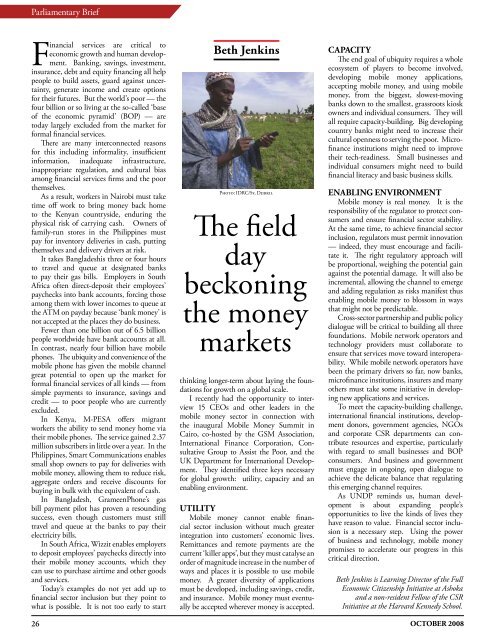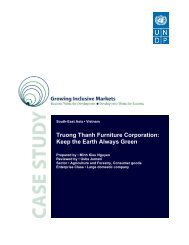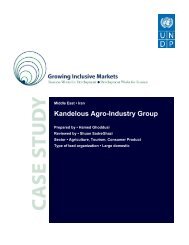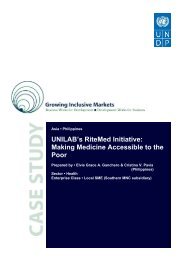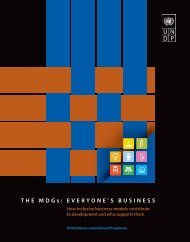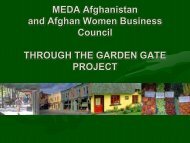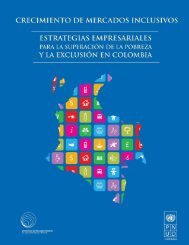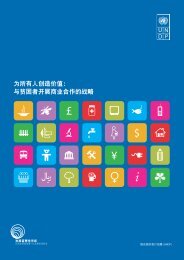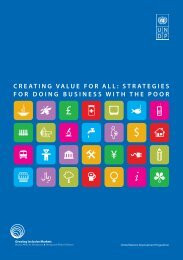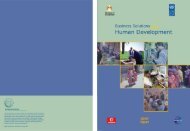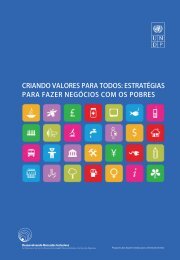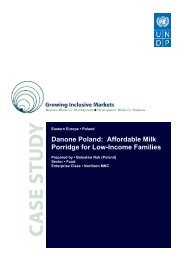Meet the consumer today's business needs to targe
Meet the consumer today's business needs to targe
Meet the consumer today's business needs to targe
- No tags were found...
Create successful ePaper yourself
Turn your PDF publications into a flip-book with our unique Google optimized e-Paper software.
Parliamentary BriefFinancial services are critical <strong>to</strong>economic growth and human development.Banking, savings, investment,insurance, debt and equity financing all helppeople <strong>to</strong> build assets, guard against uncertainty,generate income and create optionsfor <strong>the</strong>ir futures. But <strong>the</strong> world’s poor — <strong>the</strong>four billion or so living at <strong>the</strong> so-called ‘baseof <strong>the</strong> economic pyramid’ (BOP) — are<strong>to</strong>day largely excluded from <strong>the</strong> market forformal financial services.There are many interconnected reasonsfor this including informality, insufficientinformation, inadequate infrastructure,inappropriate regulation, and cultural biasamong financial services firms and <strong>the</strong> poor<strong>the</strong>mselves.As a result, workers in Nairobi must taketime off work <strong>to</strong> bring money back home<strong>to</strong> <strong>the</strong> Kenyan countryside, enduring <strong>the</strong>physical risk of carrying cash. Owners offamily-run s<strong>to</strong>res in <strong>the</strong> Philippines mustpay for inven<strong>to</strong>ry deliveries in cash, putting<strong>the</strong>mselves and delivery drivers at risk.It takes Bangladeshis three or four hours<strong>to</strong> travel and queue at designated banks<strong>to</strong> pay <strong>the</strong>ir gas bills. Employers in SouthAfrica often direct-deposit <strong>the</strong>ir employees’paychecks in<strong>to</strong> bank accounts, forcing thoseamong <strong>the</strong>m with lower incomes <strong>to</strong> queue at<strong>the</strong> ATM on payday because ‘bank money’ isnot accepted at <strong>the</strong> places <strong>the</strong>y do <strong>business</strong>.Fewer than one billion out of 6.5 billionpeople worldwide have bank accounts at all.In contrast, nearly four billion have mobilephones. The ubiquity and convenience of <strong>the</strong>mobile phone has given <strong>the</strong> mobile channelgreat potential <strong>to</strong> open up <strong>the</strong> market forformal financial services of all kinds — fromsimple payments <strong>to</strong> insurance, savings andcredit — <strong>to</strong> poor people who are currentlyexcluded.In Kenya, M-PESA offers migrantworkers <strong>the</strong> ability <strong>to</strong> send money home via<strong>the</strong>ir mobile phones. The service gained 2.37million subscribers in little over a year. In <strong>the</strong>Philippines, Smart Communications enablessmall shop owners <strong>to</strong> pay for deliveries withmobile money, allowing <strong>the</strong>m <strong>to</strong> reduce risk,aggregate orders and receive discounts forbuying in bulk with <strong>the</strong> equivalent of cash.In Bangladesh, GrameenPhone’s gasbill payment pilot has proven a resoundingsuccess, even though cus<strong>to</strong>mers must stilltravel and queue at <strong>the</strong> banks <strong>to</strong> pay <strong>the</strong>irelectricity bills.In South Africa, Wizzit enables employers<strong>to</strong> deposit employees’ paychecks directly in<strong>to</strong><strong>the</strong>ir mobile money accounts, which <strong>the</strong>ycan use <strong>to</strong> purchase airtime and o<strong>the</strong>r goodsand services.Today’s examples do not yet add up <strong>to</strong>financial sec<strong>to</strong>r inclusion but <strong>the</strong>y point <strong>to</strong>what is possible. It is not <strong>to</strong>o early <strong>to</strong> start26Beth JenkinsPho<strong>to</strong>: IDRC/Sy, DjibrilThe fielddaybeckoning<strong>the</strong> moneymarketsthinking longer-term about laying <strong>the</strong> foundationsfor growth on a global scale.I recently had <strong>the</strong> opportunity <strong>to</strong> interview15 CEOs and o<strong>the</strong>r leaders in <strong>the</strong>mobile money sec<strong>to</strong>r in connection with<strong>the</strong> inaugural Mobile Money Summit inCairo, co-hosted by <strong>the</strong> GSM Association,International Finance Corporation, ConsultativeGroup <strong>to</strong> Assist <strong>the</strong> Poor, and <strong>the</strong>UK Department for International Development.They identified three keys necessaryfor global growth: utility, capacity and anenabling environment.UtilityMobile money cannot enable financialsec<strong>to</strong>r inclusion without much greaterintegration in<strong>to</strong> cus<strong>to</strong>mers’ economic lives.Remittances and remote payments are <strong>the</strong>current ‘killer apps’, but <strong>the</strong>y must catalyse anorder of magnitude increase in <strong>the</strong> number ofways and places it is possible <strong>to</strong> use mobilemoney. A greater diversity of applicationsmust be developed, including savings, credit,and insurance. Mobile money must eventuallybe accepted wherever money is accepted.CapacityThe end goal of ubiquity requires a wholeecosystem of players <strong>to</strong> become involved,developing mobile money applications,accepting mobile money, and using mobilemoney, from <strong>the</strong> biggest, slowest-movingbanks down <strong>to</strong> <strong>the</strong> smallest, grassroots kioskowners and individual <strong>consumer</strong>s. They willall require capacity-building. Big developingcountry banks might need <strong>to</strong> increase <strong>the</strong>ircultural openness <strong>to</strong> serving <strong>the</strong> poor. Microfinanceinstitutions might need <strong>to</strong> improve<strong>the</strong>ir tech-readiness. Small <strong>business</strong>es andindividual <strong>consumer</strong>s might need <strong>to</strong> buildfinancial literacy and basic <strong>business</strong> skills.Enabling EnvironmentMobile money is real money. It is <strong>the</strong>responsibility of <strong>the</strong> regula<strong>to</strong>r <strong>to</strong> protect <strong>consumer</strong>sand ensure financial sec<strong>to</strong>r stability.At <strong>the</strong> same time, <strong>to</strong> achieve financial sec<strong>to</strong>rinclusion, regula<strong>to</strong>rs must permit innovation— indeed, <strong>the</strong>y must encourage and facilitateit. The right regula<strong>to</strong>ry approach willbe proportional, weighing <strong>the</strong> potential gainagainst <strong>the</strong> potential damage. It will also beincremental, allowing <strong>the</strong> channel <strong>to</strong> emergeand adding regulation as risks manifest thusenabling mobile money <strong>to</strong> blossom in waysthat might not be predictable.Cross-sec<strong>to</strong>r partnership and public policydialogue will be critical <strong>to</strong> building all threefoundations. Mobile network opera<strong>to</strong>rs andtechnology providers must collaborate <strong>to</strong>ensure that services move <strong>to</strong>ward interoperability.While mobile network opera<strong>to</strong>rs havebeen <strong>the</strong> primary drivers so far, now banks,microfinance institutions, insurers and manyo<strong>the</strong>rs must take some initiative in developingnew applications and services.To meet <strong>the</strong> capacity-building challenge,international financial institutions, developmentdonors, government agencies, NGOsand corporate CSR departments can contributeresources and expertise, particularlywith regard <strong>to</strong> small <strong>business</strong>es and BOP<strong>consumer</strong>s. And <strong>business</strong> and governmentmust engage in ongoing, open dialogue <strong>to</strong>achieve <strong>the</strong> delicate balance that regulatingthis emerging channel requires.As UNDP reminds us, human developmentis about expanding people’sopportunities <strong>to</strong> live <strong>the</strong> kinds of lives <strong>the</strong>yhave reason <strong>to</strong> value. Financial sec<strong>to</strong>r inclusionis a necessary step. Using <strong>the</strong> powerof <strong>business</strong> and technology, mobile moneypromises <strong>to</strong> accelerate our progress in thiscritical direction.Beth Jenkins is Learning Direc<strong>to</strong>r of <strong>the</strong> FullEconomic Citizenship Initiative at Ashokaand a non-resident Fellow of <strong>the</strong> CSRInitiative at <strong>the</strong> Harvard Kennedy School.OCTOBER 2008


